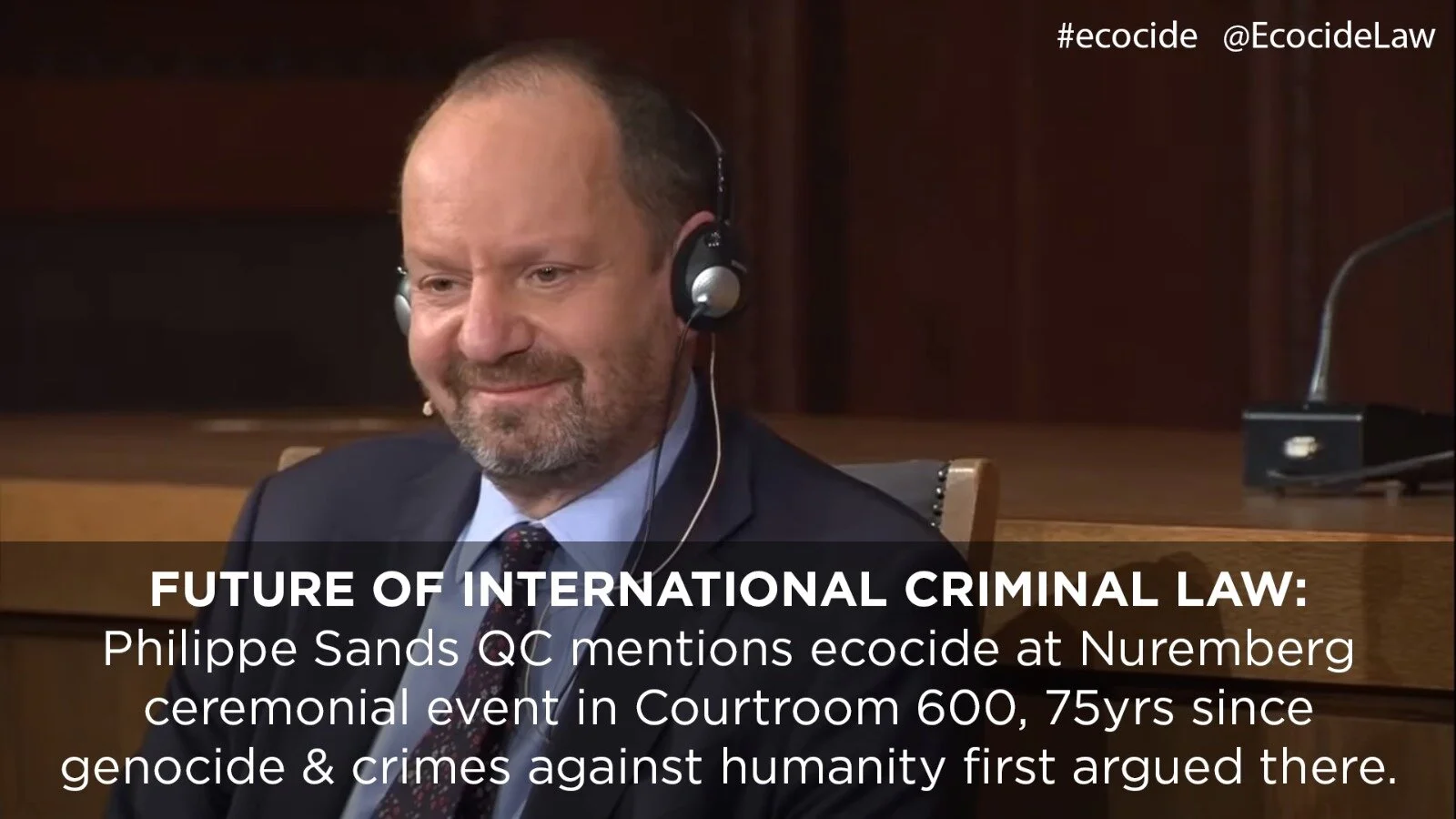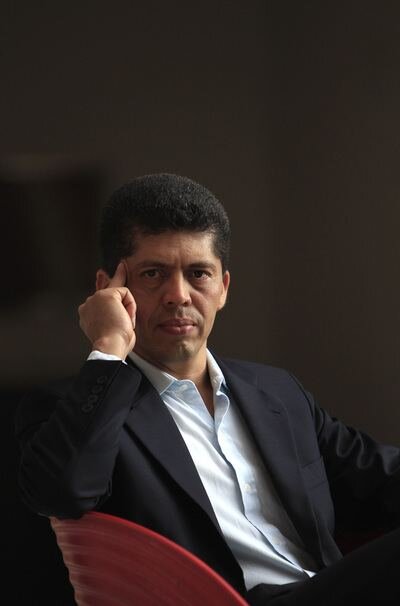Top international lawyers to draft definition of "Ecocide"
75 years after Crimes Against Humanity and Genocide coined at Nuremberg
International lawyers Philippe Sands QC and Dior Fall Sow are co-chairing an expert drafting panel on the legal definition of “ecocide” as a potential international crime that could sit alongside War Crimes, Genocide and Crimes Against Humanity. Launched with preparatory work in November 2020, and set to draft the definition over the early months of 2021, the panel has been convened by the Stop Ecocide Foundation on the request of interested parliamentarians from governing parties in Sweden.
The concept of criminalising mass damage and destruction of ecosystems or “ecocide” at a global level has been steadily gaining traction in recent months since small island states Vanuatu and the Maldives called for “serious consideration” of it at the International Criminal Court’s annual assembly of States Parties in December 2019. President Macron of France has actively promised to champion the idea and Belgium has raised the issue directly at the ICC in its 2020 official statement. Now an impressive list of top international and environmental lawyers are tackling how best to define it.
The timing of the panel launch in November 2020 was powerful, marking 75 years since the opening of the Nuremberg trials of high-ranking Nazi officers in 1945. Philippe Sands QC, co-chairing the Ecocide drafting panel, was among the speakers at a ceremonial event held in Nuremberg’s historic Courtroom 600 where the trials took place. Sands’ award-winning book East West Street documents the origins of - and the lawyers behind - the terms Crimes Against Humanity and Genocide, first used in that very courtroom. Sands is joined on the drafting panel by a heavyweight list of judges and lawyers, and the panel aims to complete its work in June 2021.
Convenor
Jojo Mehta, Chair, Stop Ecocide Foundation
Jojo Mehta, Chair of the Stop Ecocide Foundation commissioning the panel’s work, explains the significance of the project:
“There have been working definitions of ‘ecocide’ over the years and the general concept - of mass damage and destruction of ecosystems - is reasonably well understood. However when parliamentarians from a number of countries, from European states to Pacific islands, will be considering this definition in the light of possible proposal at the ICC, the text that emerges over the coming months must be both clear and legally robust. It is vital that the drafting panel has in-depth relevant legal expertise as well as a breadth of geographical perspective.”
She is thrilled with the line-up of the panel: “We couldn’t be happier with the calibre of expert this project has attracted. It demonstrates a recognition in the legal world that Ecocide can, and now perhaps should, be considered alongside Genocide and Crimes Against Humanity as one of the ‘most serious crimes of concern to humanity as a whole’. It’s an honour to be working with these judges and lawyers, and an extraordinary moment to be launching the project as the first international trials are remembered at Nuremberg.”
Panel and Comments:
Co-Chair
Philippe Sands QC, Professor, University College London/Barrister, Matrix Law (UK/France/Mauritius)
“The time is right to harness the power of international criminal law to protect our global environment - seventy five years ago, ‘crimes against humanity’ and ‘genocide’ were spoken for the first time, in Nuremberg’s Courtroom 600, and my hope is that this group will be able to draw on experience since that day to forge a definition that is practical, effective and sustainable, and that might attract support to allow an amendment to the ICC Statute to be made.”
Co-Chair
Dior Fall Sow, UN jurist and former prosecutor (Senegal)
“The numerous attacks on the environment and the living conditions of the population are worrying... Recognizing ecocide as an international crime is the most appropriate approach to fight against the impunity of this crime and its perpetrators.”
Co-Deputy Chair
Kate Mackintosh, Executive Director, Promise Institute for Human Rights, UCLA School of Law (US/UK)
“Ecocide is an international crime whose moment has come. It is increasingly clear that criminal destruction of our environment cannot continue to be regulated at national level. Environmental destruction is truly a crime against us all.”
Co-Deputy Chair
Richard J Rogers, Partner, Global Diligence; Executive Director, Climate Counsel (UK)
“The Rome Statute prohibits acts that ‘threaten the peace, security, and well-being of the world’. It is incomplete without a crime of ecocide.”
Rodrigo Lledó
Director, Fundación Internacional Baltasar Garzón (Chile)
"Ecocide is a crime that we do not have yet, but one we urgently need in our time. Ecosystem destruction is now undermining hope for the future of humanity as well as dangerously jeopardising all of life on earth."
Tuiloma Neroni Slade
Former International Criminal Court judge (Samoa)
“There cannot be a more demanding moment for the international community to take effective action now, by the terms of the Rome Statute, to address the alarming ever-manifesting dangers of gross environmental destruction, global climate change in particular, and the consequences of severe, inhumane and disproportionate damage suffered by communities around the world, especially the blameless and most vulnerable.”
Syeda Rizwana Hasan
Chief Executive, Bangladesh Environmental Lawyers Association (Bangladesh)
“Why shouldn't ... perpetrators of manmade environmental disasters be punished? Such disasters kill hundreds and thousands and sometimes millions over the years. Such crimes are crimes against Mother Earth that affect generations.”
Charles C Jalloh
Professor, Florida International University/UN International Law Commission (Sierra Leone)
"States should use all tools at their disposal, including their criminal law power at the national and international levels, to protect our shared global environment and to bring the most responsible perpetrators to justice."
Valérie Cabanes
International jurist and human rights expert (France)
“The current climate and ecological disruptions are fuelling injustice and geopolitical tensions while those ransacking the planet go unpunished. It is therefore urgent to demand new forms of responsibility and solidarity, by recognizing a fifth international crime, the "crime of ecocide".”
Pablo Fajardo
Environmental lawyer (Ecuador)
“I live in the Ecuadorean Amazon ... witness to the way in which crimes are committed against Nature, against life, on a daily basis. These crimes take their toll on humanity … and they go unpunished due to the great legal vacuum that exists globally.”
Prof Christina Voigt
Professor, University of Oslo (Norway)
“We see systemic and deliberate destruction of the environment without obvious consequences. Establishing that - above a certain threshold - such actions are crimes could bring justice, but also more importantly prevent further destruction.”
Alex Whiting
Former International Criminal Court prosecutions coordinator/Professor, Harvard Law School (US)
“The threat to the environment is the challenge of our times. International criminal law can contribute to the solution which is why defining and implementing the crime of ecocide is so essential.”
See the growing state support here.

















